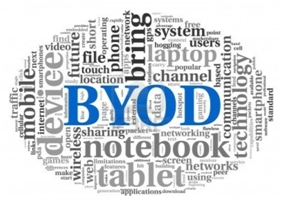 The BYOD movement is growing among businesses in the U.S. and globally. The ability of employees to bring their personal devices to work has many benefits that employers (and employees) new to the movement need to recognize and weigh before implementing BYOD in their organizations. Some of the key benefits common to bring-your-own-device programs are discussed here.
The BYOD movement is growing among businesses in the U.S. and globally. The ability of employees to bring their personal devices to work has many benefits that employers (and employees) new to the movement need to recognize and weigh before implementing BYOD in their organizations. Some of the key benefits common to bring-your-own-device programs are discussed here.
A discussion of BYOD would be remiss without chronicling where the movement began and where it appears to be going. Blackberry spearheaded the bring-your-own-device movement and has developed technologies that encourage workers to employ their devices for the benefit of the employer. BlackBerry enterprise BYOD is captured in their BlackBerry® Balance™ technology which seamlessly partitions personal and job-related work spaces. Looking to the future, it is estimated that by 2017, nearly half of all employers will require employees to supply their own devices at work.
Possibly one of the key benefits to employers and employees alike is the boost in morale that BYOD policies can facilitate among employees. In a job market where employees frequently change jobs every two to three years, it is important for employers to find solutions to attract and retain top talent. Studies have shown that employees who are permitted to bring their own devices to use at work are typically happier and more productive, promoting longevity with the company. Moreover, employees are typically happier using familiar devices rather than struggling with devices issued by the IT department. After all, employees have typically spent a lot of their hard-earned cash for their devices, and they want to use them, to the extent that they will likely put in time outside of traditional work hours. Additionally, personal devices tend to be more innovative, thus businesses can benefit from having the latest technologies at their disposal.
Another key benefit – for employers – is cost savings. We have already seen how a happier and more productive work force can equate to substantial savings for the employer. Well, having employees bring their own devices is another means of strengthening the bottom line. BYOD policies save companies money because they are not hemorrhaging cash keeping up with the latest and greatest technologies. They leave that to the employees’ discretion, who are often more likely to upgrade their devices for new ones within the two-year time frame often specified by their mobile plans, or within the three-year window for upgrading laptops. This translates to faster, more efficient devices being used by the company without necessarily having to foot the bill to obtain them. The cost is shifted to the user who, in general, will pay for all of the data or voice services.
From an IT standpoint, bring your own device policies mean that IT departments can focus more on strategic initiatives rather than being weighted down by endless helpdesk tickets. This is because the BYOD movement lends itself to IT support through the users’ own service providers. This is another cost savings boon to the employer. True, there are some problems that the local IT department will have to tackle on their own, but for the most part, support will come from the users’ relationships with their device service providers.
BYOD is not a passing fad. It is here to stay, and businesses and employees alike need to understand the benefits of this type of enterprise solution. Doing so means savings for the employer and a generally happier and more productive workforce.
Author Bio: Jessica Oaks is a freelance journalist who loves to cover technology news and the ways that technology makes life easier. She also blogs at FreshlyTechy.com. Check her out on Twitter @TechyJessy.
Photo source: ringDNA
